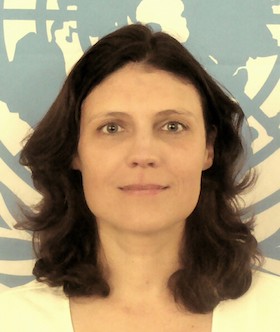 Asta Dupuy
Asta Dupuy
Internal Auditor
Office of Inspector General
United Nations World Food Programme
Public Policy Program (’04)
Please tell us about your career path so far. What is your area of specialization and how did you come to work in this area?
I started my career as economist in the Ministry of Finance in Lithuania. I was evaluating the impact of changes in fiscal laws to various sectors in the economy, social groups and macroeconomic indicators, forecasting GDP and modelling the labor market. I was trained by the Harvard Institute for International Development on micro-simulation modelling techniques. It was a very exciting and challenging time to work in the public sector in Lithuania at that time – Lithuania was on its way to join the European Union.
After GRIPS, I worked as an independent fiscal policy and modelling consultant at World Bank and European Union projects in several countries in Europe. I then pursued my career in the private sector as a financial controller at AXA Liabilities Managers in Paris, France.
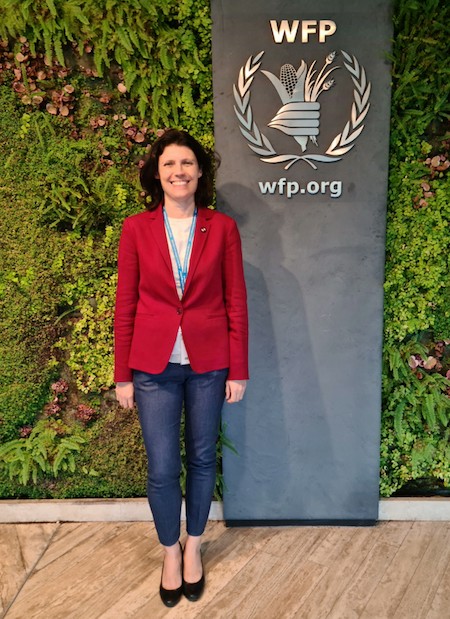
WFP Headquarters in Rome, Italy
In 2009 I joined the World Food Programme (WFP) Headquarters in Rome. Since then I have held numerous positions at WFP. I worked as an internal control and finance consultant in the Finance and Treasury division, deputy chief of the corporate Cash-based transfer branch in HQ Rome, deputy chief of the global payment function and head of finance, administration, procurement and IT in WFP Madagascar. For the last two years I was supporting Cash-Based transfer (CBT) operations. I led the successful development of CBT Due Diligence process, a control process for financial service providers that involves direct interaction with senior officials including banking executives and regulators.
Besides Public Policy studies in GRIPS, I also studied Economics in Vilnius University, Lithuania and Finance and Insurance in business school ESSEC in France. My areas of expertise are in Due Diligence, Audit, Corporate Finance, Fraud Assessment, Internal Controls, Risk management and Business processes.
You recently moved to the Office of Internal Audit at the UN World Food Programme in Rome. Why the change?
I joined the WFP’s Office of Internal Audit just recently, in July 2020. After a decade of supporting various functions in Finance in HQ and in the field, I decided to pursue my career and continue the mission from an independent perspective, helping WFP to identify emerging risks and find innovative solutions to address them, as well as adding value to the strategic audit function. The new job allows me to broaden my areas of expertise in reviewing and auditing other than Finance functional areas in the organization, including Programme, Supply Chain, Procurement, IT as well as conducting Country Office audits.
The World Food Programme has been awarded the Nobel Peace Prize this year. Congratulations! As you have been working with WFP for over a decade what does this mean to you?
The Nobel Peace Prize is an important recognition for the work that World Food Programme (WFP), together with donors, governments and partners are doing in fighting hunger worldwide. There is a deep connection between food security and peace, and this is why WFP has been chosen as the Nobel Peace laureate. Personally, and I trust my colleagues would join me, that this was the best performance evaluation that we could have ever imagined. I can’t deny that I wasn’t deeply touched by this news.
The importance of WFP’s mission to end global hunger is self-explanatory – I can’t imagine anyone arguing with that. WFP staff is at front lines to deliver assistance (in 2019 WFP assisted 97 million people in 88 countries – two thirds of these are in conflict-affected countries), therefore, contributing to preventing more conflict and migration, often risking their lives in war and conflict zones and working beyond and above to reach those in need. If this award would bring a greater world’s attention to the most vulnerable people on earth, I would then say, yes, the Nobel Peace Prize did its job. Our focus remains with beneficiaries.
What are some of the biggest challenges you face in your work? And what have been the most interesting or rewarding aspects of your career thus far?
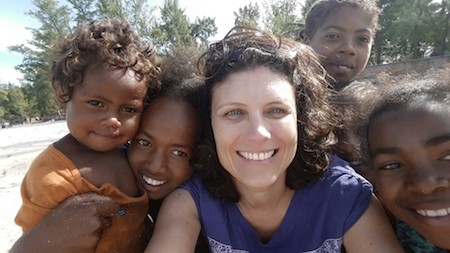
With children from a local village in Madagascar.
The biggest challenge is that working for such large organization as WFP, prior to implementing a corporate initiative, we have to make sure that all aspects were considered, key risks identified and addressed, involved parties and key stakeholders were consulted, required actions and informed decisions were taken timely and efficiently. This would often require a lot of effort but the thrive for efficiency and excellence is a driving force on a daily basis. Furthermore, WFP works in the most difficult environments, and a trade-off between meeting operational needs and assessed risks sometimes can be challenging.
I think that my most rewarding souvenir is from my time in Madagascar. I was in Southern Madagascar on an oversight visit to WFPʼs sub-offices and we stopped in a village where WFP had a cash for assets programme that included building a water-harvesting structure to store rainwater and enhancing self-sufficiency in cultivating agricultural products, so that communities would grow their own food. The entire village, including adults, adolescents and children came to talk to us and thank WFP for the support provided to the community. I can still feel peopleʼs joy and the sense of ownership of the assets that they had created and their pride in their achievements. It was truly a rewarding day.
What led you to GRIPS? What is the most important thing you got out of your studies here, and how has your experience at GRIPS prepared you for future endeavors?
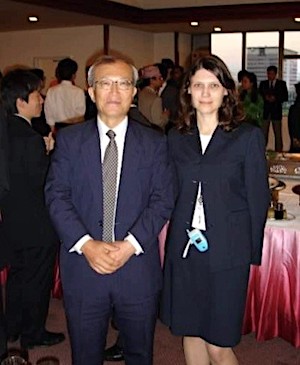
With thesis advisor Prof. Okita at the graduation reception in Odaiba, Tokyo
Admission to GRIPS along with the Japanese government’s “Monbukagakusho” scholarship opened to me a wonderful opportunity to study abroad. Firstly, GRIPS prepared me for work in an international environment. I did enjoy engaging in academic, cultural and political discussions with so many international students at GRIPS and Tokyo International Exchange Center. GRIPS provided us with an excellent forum to generate and discover new ideas. Secondly, I gained solid knowledge in Econometrics, advanced Macroeconomics and other. The Fiscal policy was the main macroeconomic tool to manage and stimulate the economy in Lithuania, when the Monetary policy was rather limited (Litas was first pegged to the US dollar and then to the Euro). I, therefore, was very happy to learn about the Monetary policy strategies and tools at GRIPS. Thirdly, studies at GRIPS gave me confidence to tackle the real world with many challenging tasks. I think that it is very exciting and professionally stimulating when you are constantly embracing the unknown and, therefore, excel or broaden your experiences.
You have been living away from your home country for quite some time. What do you like about living in Rome? And what you miss about Lithuania?
I lived in Lithuania, France, Japan, Italy and Madagascar and all these countries have a special meaning to me. Rome is a beautiful city. Every street here is a museum. One can reach mountains, sea, forests, lakes, and wild fields in a less than an hour from Rome, and therefore easily reconnect with the nature. I also like the sound of church bells in Rome. It feels comfortable.
Lithuania, of course, has a special place in my heart. I was born and raised in Vilnius. What I miss the most about Lithuania is simplicity. The beauty of Lithuania is in simplicity. I think that there is a special bond between Lithuanian people and their forests. When I walk in the Anykščiai Regional Park (an area in the eastern part of Lithuania with vast forests and breath-taking panoramas), I always remember the poem “The forest of Anykščiai”, written in 1859 by the Lithuanian poet Antanas Baranauskas, who, brilliantly depicted the deep existential connection with the roots of who we are as humans, our creative powers and spiritual values.
How do you maintain a balance between your work and the rest of your life? And what is your favorite thing to do when you are not working?
The biggest challenge is to draw the line and stop working after regular working hours. When you know that your support and decisions are important for operations, often it is difficult to just cut everything and go to sleep. Prior to COVID-19 my work involved a lot of travelling outside Italy. This was the challenging time for my family too.
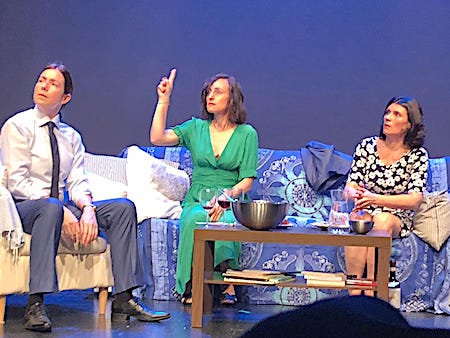
Performance of Le Prenom play in Rome, Italy
Quality time spent with my family is a priority. I also love to act at a theatre. I am acting in a French theatre in Rome. The play rehearsals can be very intense and, surprisingly, this is one of the rare activities that can completely block my mind from thinking about work. I performed Arganʼs role in Molière’s “Le Malade Imaginaire” and Élisabeth’s role in Alexandre de la Patellière’s and Matthieu Delaporte’s “Le Prénom”, both directed by Hélène Sandoval. It is always awarding when you create a connection with the audience, and both audience and actors spend a wonderful time during the performance.
What do you miss about Japan?
I miss a lot of things about Japan. I miss Japanese food and ability to eat sushi everywhere. I miss Japanese trains and Tokyo’s huge train stations. It was a bit of a challenge to find the right exit in Tokyo’s Shinjuku station. Moreover, after Shinjuku, Shibuya was not that crowded in the end!
I have assimilated with the Japanese way of life instantly. I was bowing (naturally), sleeping on trains, respected the seniority, was queuing to wish a happy birthday to the emperor and my books had book covers when I was reading in public. Of course, these are the details and there is much more to say about Japan, but this is to demonstrate that I enjoyed every single day in Japan and every single detail was important.
If you could give one piece of advice to anyone considering studying at GRIPS what would it be?
GRIPS offers a variety of study programs with a reasonable flexibility to structure your curriculum according to your preferences. You may focus on economics, politics or/and leadership. I studied the Master’s in public policy and was able to shape my curriculum so that my courses would fully cover advanced economics, analysis techniques including econometrics and not as much of pure politics, in which I was less interested. So, my advice, see what exactly you are interested in professionally and choose what is best for you.
How would you like to maintain involved with the School? What do you expect from GRIPS as an alumnus and do you have any suggestions on how to further utilize the GRIPS alumni network?
The GRIPS global web reunion this year was a wonderful initiative. The subjects debated were very much relevant in the current COVID-19 context. The web reunion itself was an excellent forum for further enhancing links between alumni network. Myself, I was very happy to see new faces, hear different opinions about the leadership in emergencies and share my own experience in supporting WFP operations during the COVID-19 pandemic. The alumni network could be very useful in the international environment, especially when someone’s work is related to multiple countries and therefore sharing knowledge and experience could be mutually beneficial.





